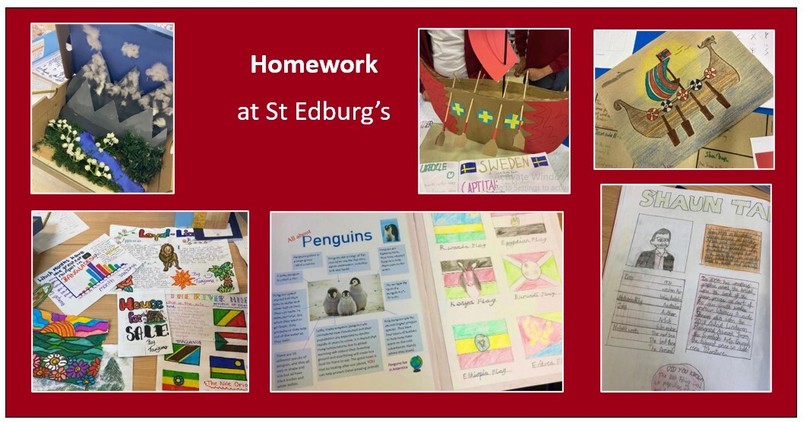Homework at St Edburg's
“But the angels said to them, “Do not be afraid, I bring you good news that
will cause great joy for all people.”
Luke 2:10
Everyone is included in the St Edburg’s family, inspired to make a positive change and encouraged to interact with the community around us.
All are valued, all are loved.
Homework refers to tasks given to pupils by their teachers to be completed outside of usual lessons. Research shows that homework has a positive impact on learning for pupils, adding up to five months extra progress (EEF, 2021). At St Edburg’s, homework activities vary slightly, particularly between younger and older pupils including, but not limited to. nightly home reading, times table and spelling practise, and weekly and termly homework projects linked to work done in school.

Reading, Spellings and Times Tables
At St Edburg’s, EYFS and KS1 children are expected to read daily at home. Children receive weekly spellings and complete 'Numbots' weekly. Year 2 also complete a weekly task related to their current topic. Reading remains high priority in Key Stage 2 with the expectation that children read at least three times per week and record their reading in their reading records. Children in KS2 have weekly spellings to learn, and are encouraged to use Times Tables Rock Stars at least three times per week.
Creative Approach
To enable older pupils to put their independent learning to practice and consolidate knowledge learnt in school, Years 3 and 4 complete weekly homework tasks chosen from a homework menu, which are then brought into school and shared every Friday. This helps our Lower Key Stage 2 children to begin to work independently and develop problem solving skills.
"The quality of work is wonderful! It’s fantastic to see what the children can produce on their own. I look forward to this every term.” Year 6 parent
“I'm so impressed by the children's homework every term. It's brilliant that they are so inspired to create such high-quality work independently. Lovely that the younger children can come and see what is expected of them in a couple of years, too." Year 5 parent.
"I love seeing these! I can't wait to do this when I'm older." Y3 pupil
For our oldest pupils in Upper Key Stage 2, children in Years 5 and 6 complete termly homework projects across a number of weeks. This project based approach encourages children to take control of their workload and increase time management skills as they prepare for the expectations of secondary school. Projects are brought into school on the last Wednesday of each half term when parents and carers are invited to attend our ‘Homework Extravaganza’. The children present their finished pieces to visiting adults and younger children in the school giving their efforts a sense of purpose and reward.
Helping your child with homework
We encourage children to complete homework as independently as possible, but recognise that independence increases with age and confidence. Parents and carers can play an important role in supporting their child with homework, so here are some of the ways you can help.
- Homework-friendly Area
Having a dedicated space for children to do homework will help them stay focused
- Routine Study Time
A regular routine helps children get used to working at home. Some children work best in the morning, while others may prefer the afternoon. Work out a routine where your child is the most productive.
- Make Sure They’re Working as Independently as Possible (age depending!)
Homework is important, but only if children use this time well. If adults do the work for them, they’re not going to see the benefits, or feel as proud once their work is completed. It’s important you’re there to support and help them understand the work if they need clarification, but let them do as much as they can on their own.
- Praise
Recognising the hard work that they’re putting in and praising them for it is a great way to get children to respond positively to homework. In school we’ll reward them for their efforts with house points and merits!
- Make a Plan
Children can get overwhelmed if they have a lot of work to do. One piece per week makes the work more manageable.
The response to our homework projects is overwhelmingly positive with close to 100% of tasks being completed each week or term, from 100% of children. We do recognise, however, that homework can be tricky to support at home in some circumstances. We offer a limited number of places in homework club for Years 4, 5 and 6. If you would like to know more about this, please contact the school office.













